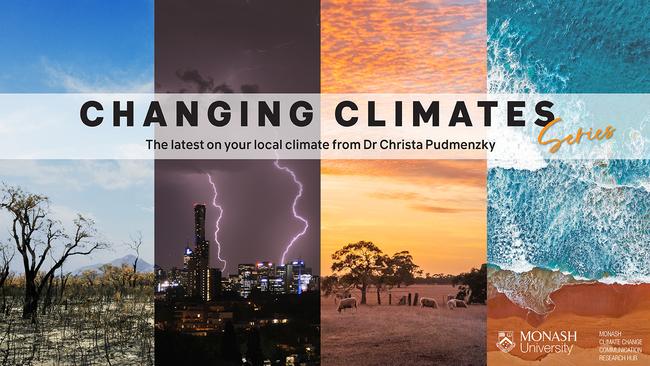Wild weather withering the supply of Aussie wines
Word on the grapevine is Australian wine supply is at risk of shrivelling up. Dr Christa Pudmenzky explains the role of our changing climate.

Hyperlocal
Don't miss out on the headlines from Hyperlocal. Followed categories will be added to My News.
Wineries across Australia are feeling the squeeze of climate change, with over 70 wine producing regions expected to experience hotter conditions in the future.
Australia's wine season spans from October to April, with the growing, harvesting, crushing and fermenting of grapes all taking place within that seven-month window.
This tight turnaround of vine to wine doesn't leave much room for error, which makes the increasing impact of climate change rather troublesome.
This past season was hit by a multitude of extreme weather events.
Before the growing season even began, Australia experienced its driest three month period in 124 years.
And this meant crucial early seasonal rain that helps hydrate the soil didn't fall.
The vines were hit again during the middle of the season as summer heatwaves, bushfires and thunderstorms lashed key growing regions, often one after another.
Alongside these extreme events, temperatures continued to rise across the country including here in Ipswich.
For example, the hottest autumn day is now 2.3C warmer than 55 years ago.

Shriveling season
Just as people are picky about their wines, wine grapes are selective too.
Grapes need just the right set of conditions to flourish, making them highly sensitive to changes in temperature and rainfall.
Even a one-degree shift outside a grape variety's ideal growing temperature range can mean the difference between a poor, decent, or outstanding wine.

Fragile fruit
Climate change is already uncorking mischief, and taking a toll on wine quality and flavour.
The pace of grape ripening hinges on heat.
Higher average temperatures mean grapes may ripen ahead of schedule.
While this may sound like a plus, early ripening alters their sugar and acidity levels, and makes it more difficult for growers to ensure our beloved wine hits the right notes.
This seasonal shift doesn't just impact wine quality, it also has flow-on effects for the supporting logistics and infrastructure that gets wine from farm to table.
Grapes are also vulnerable to short bursts of extreme weather such as heatwaves.
Sun exposed grapes can experience temperatures up to 15 degrees hotter than those shaded by vine leaves – well and truly enough heat to cause damage to the crop.
Increasingly frequent and intense extreme weather events are also making it harder for growers to prepare.
Summer typically sees growers bracing for hot conditions, and increasing canopy cover to protect the grapes from sunburn.
However, wild, wet conditions – like many regions saw this past summer – can sweep in and upset this preparation.
Covering the vines reduces air circulation, making it more difficult for the vines to dry out and in turn increasing the chance of disease.
Evidence of these increasingly warming and erratic conditions suggest growing certain types of wine grapes in Australia – particularly those suited to cooler climates like sauvignon blanc, chardonnay and pinot noir – will be more challenging and may leave winemakers in a grape deal of trouble"".
Outpour of solutions
To ensure we can keep enjoying a tasty tipple, there are plenty of things wine consumers can do.
Supporting local wineries is a great way to start and a lovely opportunity to spend time with friends.
Pairing your glass with regional produce like cheeses and berries can help reduce your carbon footprint too.
We can also get creative by recycling, or upcycling old wine bottles – such as into mini succulent planters – which gives energy-intensive materials like glass a second life.
Putting a cork in our greenhouse gas emission is ultimately the best way to ensure wine is plentiful for seasons to come.
Taking public transport is an easy way to do this, and lets us enjoy our drinks responsibly.
Together we can crush climate change, and raise a toast to a better future.
Want more information on how your climate is changing? Check out the last article in this series.
Dr Christa Pudmenzky is a climate scientist at the University of Southern Queensland.
This column is part of a collaboration between Monash University and News Corp to deliver hyperlocal weather and climate information.


